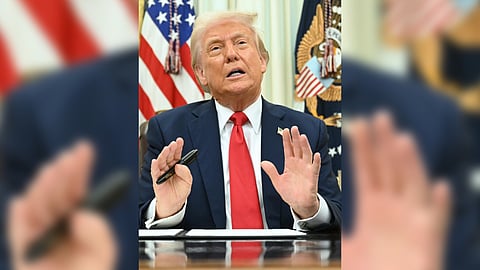
- NEWS
- the EDIT
- COMMENTARY
- BUSINESS
- LIFE
- SHOW
- ACTION
- GLOBAL GOALS
- SNAPS
- DYARYO TIRADA
- MORE

Looking at the bigger picture, analysts find that US President Donald Trump’s Liberation Day tariffs may have net positive effects on the country.
Even though the US is the country’s largest commodity destination, it still accounts for only around 16 percent of total exports as of February 2025.
“Participation in Regional Comprehensive Economic Partnership (RCEP), which includes ASEAN, China, South Korea, Japan, Australia and New Zealand, gives us plenty of other large markets for our exports. The trade barriers erected by the US could also open the floodgates for the influx of more products from our neighbors,” according to a review of AP Securities.
For example, it is possible for Chinese, Korean and Japanese cars and manufactured goods from Thailand, Vietnam and Indonesia to be more readily available.
“The Philippine economy is primarily driven by domestic consumption, around 75 percent of gross domestic product (GDP) and our main exports are mainly services in the form of overseas Filipino workers (OFWs) and business process outsourcing (BPO) offices,” according to the AP report.
AP added, “By contrast, the export of goods accounted for only 13.8 percent of GDP in 2024. So while we do not downplay the risks posed by these tariffs on the global economy and the possible knock-on effects on the Philippines, we believe the effect on the local economy would be net positive.”
Regina Capital Development Corp. managing director Luis Limlingan said local shares made a furious return after falling to their lowest since October 2022, “as many countries came to the negotiating table to resolve the tariff war ignited by President Trump.”
Philippine Exporters Confederation Inc. president Sergio Ortiz-Luis Jr. said the government will likely not negotiate for lower tariffs on imports of semiconductors and electronic products to the United States.
“Any country with higher US tariffs and exports to the US can do that. Trump doesn’t even care about their retaliatory tariffs, so why should Trump listen to our government?” Ortiz-Luis told Daily Tribune in a phone call.
“I don’t think the government will negotiate,” he added.
US President Donald Trump ordered a 17 percent tariff on Philippine exports, the lowest in Southeast Asia.
The tariff is expected to be implemented generally today.
Tariffs on electronic and automobile components will be imposed on 3 May.
Before the tariff announcement on 2 April, S&P Global reported that the local manufacturing sector had already contracted to 49.4 from an expansion of 51 in February based on its Purchasing Managers’ Index.
The index, which reflected insights from 400 local manufacturers, revealed that purchasing managers saw stiff global competition, leading to fewer orders.
Ortiz-Luis said the local semiconductors and electronics industry will contract substantially if competitors, such as Taiwan and Japan, negotiate for US tariff exemptions.
